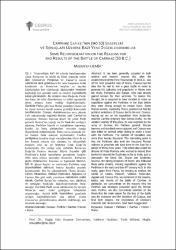| dc.contributor.author | Demir, Muzaffer | |
| dc.date.accessioned | 2020-11-20T17:18:44Z | |
| dc.date.available | 2020-11-20T17:18:44Z | |
| dc.date.issued | 2018 | |
| dc.identifier.issn | 2147-8058 | |
| dc.identifier.issn | 2148-1431 | |
| dc.identifier.uri | https://app.trdizin.gov.tr//makale/TWpreE9URXpNdz09 | |
| dc.identifier.uri | https://hdl.handle.net/20.500.12809/6735 | |
| dc.description.abstract | I. Triumvirliğin MÖ 60 yılında kurulmasından sonra Roma’nın en güçlü üç lideri arasında yerini alan Crassus’un Pompeius ve Caesar’ın askeri zaferlerine denk gelebilecek bir zafer kazanırsa, belki kendisinin de Roma’nın meşhur ve sayılan liderlerinden biri olabileceği düşüncesine kendisini kaptırdığı tezi genelde antik ve modern kaynaklarda kabul görmektedir. Bu sebeple onun Doğu’da Parthlara karşı bir sefer düzenlemeye ve onları egemenlik altına almaya karar verdiği öngörülmektedir. Özellikle Florus gibi bazı Roma yazarları Crassus’un bu siyasi hırsının kendi sonunu getirdiği konusunda hemfikirdirler. Crassus, Antiokheia’dan yola çıkarak Urfa yakınlarında bugünkü Harran, yani Carrhae’ye ulaşmıştır. Buranın batısına düşen bir yerde Parth generali Surena’nın yaptığı ani bir baskınla yenilgiye uğramış, Parthlara bayrak ve sancaklarını kaptırmış, kendisi de barış görüşmeleri sırasında tuzağa düşürülerek öldürülmüştür. Roma savaş alanında yirmi binden fazla askerini kaybetmiştir; Carrhae yenilgisinin kendine özgü sonuçlarından birisi de on bin Romalı askerin esir alınması ve nihayetinde bunların otuz üç yıl boyunca Uzak Doğu’da kalmalarıdır. Bu yenilgi aynı zamanda Roma’nın Doğu’da Fırat’ın ötesinde Büyük İskender gibi Hindistan’a kadar topraklarını genişletme hayallerinin sonu olması açısından önemlidir. Roma’nın güçlü imparatorları Traianus ve Septimius Severus, MS II. yüzyıl başları ve sonlarında Parthlara karşı düzenledikleri seferlerle benzer hayaller peşinde koşmuşlardır. Biz bu çalışmamızda Florus dışında, Cicero, Plutarkhos, Velleius Paterculus, Appianus ve Cassius Dio gibi antik yazarların metinlerini analiz ederek, Carrhae Savaşı’nın sebepleri, yeri, taktikleri ve sonuçları hakkında değerlendirmelerde bulunacağız. Özellikle Parth savaş taktiklerinin bu savaşta Roma’ya nasıl üstün geldiğinin sebeplerini araştıracağız. Ayrıca antik kaynakların genelinde savaşın kaybedilmesinin ana sebebi olarak Crassus’un gösterilmesinin abartılı olabileceği tezi üzerinde duracağız. | en_US |
| dc.description.abstract | It has been generally accepted in both ancient and modern sources that after the establishment of the First Triumvirate in 60 B.C., one of the most powerful men of Rome, Crassus had the idea that he had to win a great battle in order to promote his authority and popularity in Rome over his rivals, Pompeius and Caesar, who had already gained renown for their victories. To realize this thought, he is assumed to have decided to make an expedition against the Parthians in the East before they were strong enough to invade Syria. Some Roman writers, especially Florus, pointed out that the political ambitions of Crassus led to his end. Crassus, having set out on his expedition from Antiochia, reached Carrhae (Harran) near Edessa (Urfa). At the western vicinity of this place, he was surprised by the army of Surenas, the Parthian general. Roman banners and standards were captured and Crassus was also killed in turmoil while trying to make a truce with the Parthians. The number of casualties was more than twenty thousand. The interesting point is that the Parthians also took ten thousand Roman soldiers as prisoners and kept them in the East for a period of thirty-three years. This defeat also ended the dreams of those Romans who wished to extend their territories beyond the Euphrates as far as India, just as Alexander the Great did. Trajan and Septimius Severus, the strong emperors of Rome, also followed these same dreams, making expeditions against the Parthians in the early and late IInd century A.D. In this study, apart from Florus, by striving to analyze the works of Cicero, Plutarch, Velleius Paterculus, Appian and Cassius Dio, we comment on the reasons, tactics and results of the battle of Carrhae. In particular, we concentrate on the reasons why the Parthian war strategies prevailed upon the Roman ones. Further, we also concentrate attention on the thesis that the main reason for the loss of the battle was the character and the decisions of Crassus, and find both reasons, the importance of Crassus’s character and his decisions, have been exaggerated. | en_US |
| dc.item-language.iso | tur | en_US |
| dc.item-rights | info:eu-repo/semantics/openAccess | en_US |
| dc.subject | Arkeoloji | en_US |
| dc.subject | Tarih | en_US |
| dc.subject | Dil ve Dil Bilim | en_US |
| dc.title | Carrhae Savaşı’nın (Mö 53) Sebepleri ve Sonuçları Üzerine Bazı Yeni Değerlendirmeler | en_US |
| dc.item-title.alternative | Some Reconsideration on the Reasons for And Results of the Battle of Carrhae (53 B.C.) | en_US |
| dc.item-type | article | en_US |
| dc.contributor.department | MÜ, Edebiyat Fakültesi, Tarih Bölümü | en_US |
| dc.contributor.institutionauthor | Demir, Muzaffer | |
| dc.identifier.volume | 6 | en_US |
| dc.identifier.issue | 0 | en_US |
| dc.identifier.startpage | 233 | en_US |
| dc.identifier.endpage | 248 | en_US |
| dc.relation.journal | Cedrus: Akdeniz Uygarlıkları Araştırma Dergisi | en_US |
| dc.relation.publicationcategory | Makale - Ulusal Hakemli Dergi - Kurum Öğretim Eleman | en_US |


















